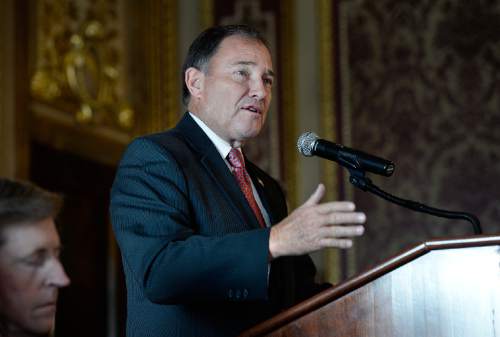This is an archived article that was published on sltrib.com in 2014, and information in the article may be outdated. It is provided only for personal research purposes and may not be reprinted.
Buried in Gov. Gary Herbert's budget blueprint is a proposal that is sure to have the users of e-cigarettes fuming.
In a footnote on page 22 of his outline, Herbert is proposing a new tax on e-cigarettes that his office predicts will raise $10 million next year.
Herbert, who boasted his budget is free of tax increases, says he doesn't consider the new e-cigarette tax to be a tax hike, but rather a change in the way the state treats the products.
"It's just saying, 'Here's a product that should fit under the umbrella of tobacco,' " Herbert said in an interview with The Tribune. "It's a health issue and there are some that think this new e-cigarette that young people are getting hooked on, that's straight nicotine with good flavors and all that stuff that makes it attractive, should be taxed just like we tax tobacco."
The governor's office could not provide specific details of how the new e-cigarette tax would work. There are several options, said Herbert's spokesman Marty Carpenter, and the governor is willing to work with legislators to find the best one.
Rep. Paul Ray, R-Clearfield, an anti-tobacco crusader in the Legislature, said he has met with the governor and representatives from the "vaping" industry and believes the best option would be to tax the e-cigarette liquid, or e-juice, at a lower rate than regular tobacco products, but that it should still be taxed.
Typically, tobacco products other than cigarettes are taxed at 87.5 percent of the wholesale price in Utah. Ray is proposing a rate of about half that for the e-juice. That would add several dollars to the cost of the average bottle of e-juice he said.
"What we have to look at is a fair tax, because tobacco is being taxed and this is a tobacco derivative," Ray said. "I've approached the industry and said, 'OK, you're claiming this is less harmful, so let's go somewhere in the middle, somewhere around 40 percent.' "
The e-cigarette vaporizers, that turn the juice into steam to be inhaled, would not be taxed. Ray said he hopes the increase in price would be enough to discourage young people from picking up vaping in the first place.
But Aaron Frazier, executive director of the Utah Smoke-free Association, said that upping the price of e-cigarette liquid will mean people will just keep smoking more harmful cigarettes.
"What that's going to do is protect the tobacco market and drive the price of the e-liquid above and beyond what the price of tobacco cigarettes are," Frazier said. "Basically, what they're doing is removing any benefit for a smoker to move over to a scientifically documented less-harmful product and drive them back to smoking tobacco cigarettes."
Ray said he believes that, within a few years, science will show the health benefits that supporters of e-cigarettes boast about are fiction.
"I think it's going to be as bad as tobacco down the road," he said. "People will realize this stuff is not as good as we were told and we're going to have health problems down the road."
Frazier said several states have looked at imposing e-cigarette taxes as a cash cow to make up for the tobacco-tax revenue they're losing because people are using e-cigarettes to quit smoking.
According to the group Americans for Tax Reform, which opposes e-cigarette taxes, Washington, Oregon, Hawaii, Oklahoma, Wisconsin, Indiana, Kentucky, South Carolina, New York, Delaware, Vermont, Massachusetts and Maine have all considered legislation looking to tax e-cigarettes, but it has been defeated. In Arizona, an e-cigarette tax is still pending.
Only two states — Minnesota and North Carolina — have an e-cigarette tax in place, according to the National Conference of State Legislatures. Minnesota taxes the liquids at 95 percent of the wholesale price of the liquids. North Carolina imposes a tax of a nickel per milliliter.
Ray also is planning to once again sponsor legislation to regulate the sales of e-cigarettes. Last session, he ran a bill that got worked over with multiple amendments and was up for passage on the final night when the Legislature adjourned without voting on it.
The bill would require businesses that sell e-cigarettes to be licensed by the state and the retailer could lose its license if it sold e-cigarettes to anyone under the age of 19.
Twitter: @RobertGehrke



